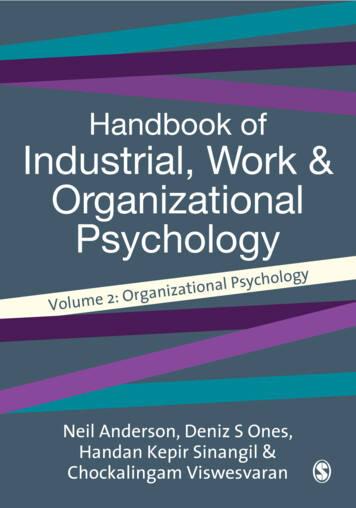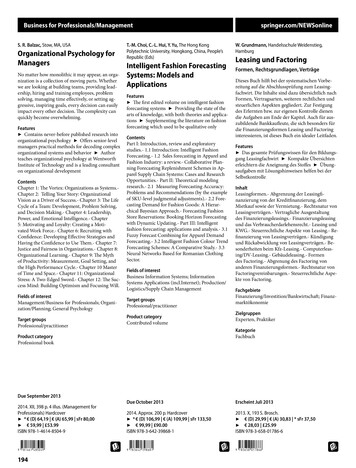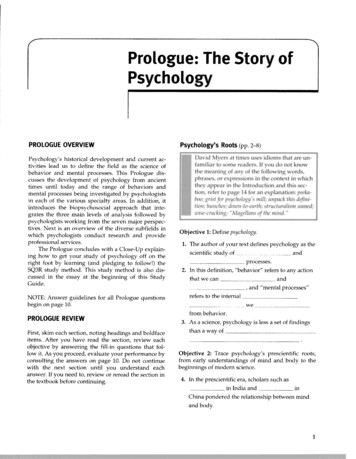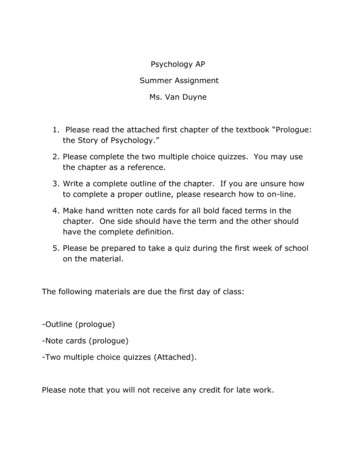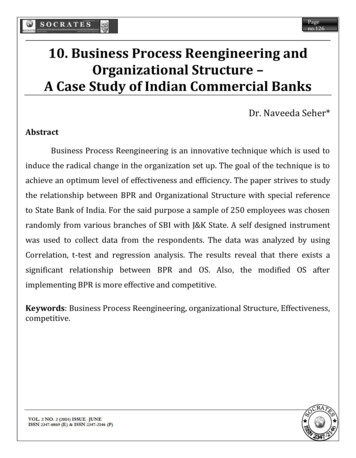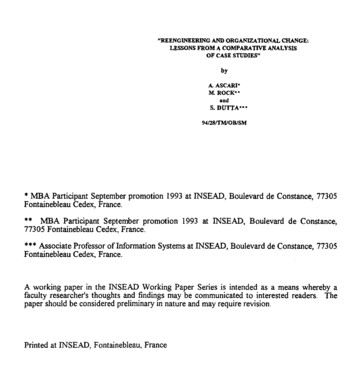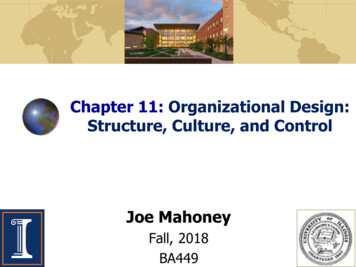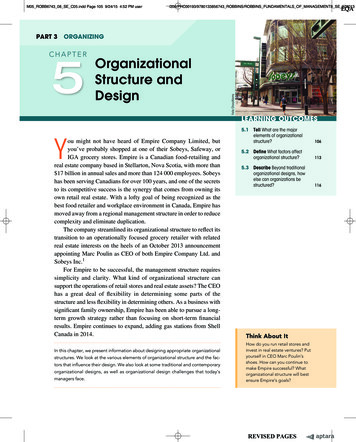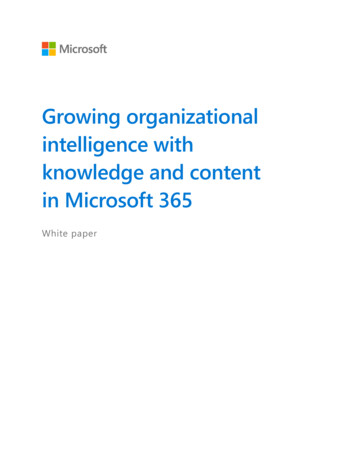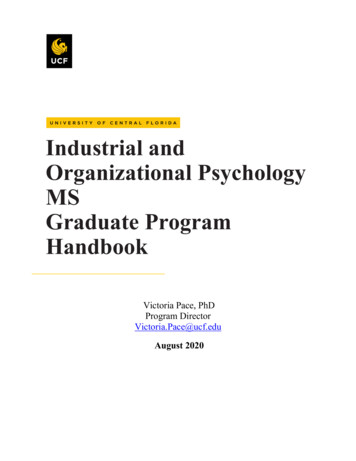
Transcription
Industrial andOrganizational PsychologyMSGraduate ProgramHandbookVictoria Pace, PhDProgram DirectorVictoria.Pace@ucf.eduAugust 2020
TABLE OF CONTENTSGENERAL INFORMATION3PROGRAM REQUIREMENTS5PROGRAM MILESTONES14FINANCIAL ASSISTANCE16OTHER POLICIES17The UniversityThe DepartmentThe ProgramProgram ContactsAdvising and MentoringProgram TracksSample Course SchedulesProgram Course DescriptionsNon-Thesis Research ProcessThesis Research ProcessPracticum ProcessOrientation MilestoneFirst Semester MilestoneFirst Year Progress MilestonePracticum Planning MilestoneThesis Option MilestoneSecond Year Curriculum Planning MilestoneGraduation Review MilestoneCommencement Review MilestoneFellowshipsAssistantshipsGTA Training RequirementsTuition SupportStudent Rights and ResponsibilitiesPetitions and GrievancesTime Limitations for Degree CompletionTransfer CreditsMSIOP Graduate Program WebcourseThe information in this handbook supplements but does not replace information in the UCF Graduate Catalog.2
GENERAL INFORMATIONWelcome to the Master of Science Degree Program in Industrial and Organizational Psychology.We refer to our program as “applied” and “professional.” The “applied” refers to our focus onthe application of theory and research to the human resource problems encountered by today’sindustrial organizations. The “professional” refers to our commitment to equip our graduateswith an arsenal of professional skills which will ensure their continued employmentmarketability.Thank you for choosing to continue your graduate career here at UCF. The next two years willbe rigorous and demanding. But the next two years will also be fruitful and rewarding.The UniversityThe University of Central Florida is located 13 miles from downtown Orlando on a 1,200-acrecampus adjacent to the Central Florida Research Park. It is within one hour of the AtlanticOcean, the Kennedy Space Center, and the Walt Disney World Complex. Since its opening in thefall of 1963, it has developed into a comprehensive state university offering degree programs atall levels of instruction. UCF currently has an enrollment in excess of 60,000 students and offersmore than 210 baccalaureate and advanced degree programs. The University's mission is toprovide high-quality educational, cultural, social, and research programs to citizens of CentralFlorida, the state, and the nation.The DepartmentThe Department of Psychology consists of more than 50 faculty members with interest in areassuch as clinical, human factors, cognitive, experimental, and developmental social psychology,as well as industrial and organizational psychology. Faculty of the department are involved in avariety of research projects concerned with topics such as Post-Traumatic Stress Disorder inveterans, the treatment of marital dysfunction, visual performance in low-level flight, technologyand assessment, diversity in the workplace, occupational health psychology and workplacestress. Research equipment is available for research on topics such as computer graphics, imagegeneration for visual flight simulation, visual adaptation and contrast sensitivity in visualperformance, team training, performance assessment, and transfer of training. Extensivesimulation equipment is available for research through the university's Institute for Simulationand Training. In addition to the Master of Science degree in Industrial/OrganizationalPsychology, the department offers a Master’s degree in Clinical Psychology, and doctoraldegrees in Clinical, Human Factors, and Industrial and Organizational Psychology.The ProgramThe Master of Science program in Industrial and Organizational Psychology is located at theUCF Orlando Main campus and Orlando Technical Center Building 600 in Research Park. Thepurpose of the Master's program is to provide high quality professional training in the traditionalareas of I/O Psychology and to prepare graduates for careers as practicing psychologists inapplied, organizational settings. The program is administered by the program director and acommittee of the entire I/O program faculty. Faculty members for the master’s program overlapwith the doctoral program faculty. Areas of interest represent the basic areas of personnel3
psychology, organizational behavior, general experimental psychology, and human factorspsychology. Our I/O faculty is actively involved in teaching/training, research activities, andapplied practice. In addition, I/O faculty members maintain active liaison with local businessfirms which provide practicum placements, job opportunities, and support for program students.Program ContactsVictoria PaceProgram DirectorPSY 281JUCF Orlando(407) 823-4481Victoria.Pace@ucf.eduDani DraperPSY 301GGraduate Admissions Specialist UCF Orlando(407) 823-2458Danielle.Draper@ucf.eduFlorian Jentsch, ChairPsychology DepartmentPSY 301PUCF Orlando(407) 823-3576Florian.Jentsch@ucf.eduTosha DuprasInterim DeanCollege of SciencesCSBUCF Orlando(407) 823-6725Tosha.Dupras@ucf.eduAdvising and MentoringThroughout your graduate career here at UCF, you may have several different advisors. Thereare, however, three advisor roles defined in the program.Academic AdvisorAll questions regarding courses, curriculum, and program policies and procedures are referred toyour academic advisor. The program director is academic advisor for all students enrolled in theMS I/O program.Research AdvisorThe research advisor supervises the student research activities. Students electing the thesis optionmay select their own research advisor from the I/O faculty. The research advisor serves as thechairperson of the thesis committee. Students electing the non-thesis option may be supervisedby a faculty advisor for research lab work, or the program director in conjunction with theDirector of UCF Performance Solutions.Practicum AdvisorThe practicum advisor supervises the student’s activities when working at a practicum orinternship site. Usually, the practicum advisor will be the program director.4
PROGRAM REQUIREMENTSThe Master’s Program in Industrial and Organizational Psychology is a professional graduateprogram which focuses on the development of practitioner skills in the areas of employeeselection, training, performance appraisal, and other relevant competencies needed in theapplication of Industrial and Organizational psychology. Our program is geared for students whohave interest in acquiring or honing applied knowledge, skills, and abilities. It is a 38-hour, fulltime program, and is designed to be completed in two years. In addition to our applied focus, theprogram emphasizes the development of strong research skills.Program TracksTwo program tracks are available. Most of our students elect the non-thesis option. This optionrequires students to complete 26 hours of academic coursework, 12 credit hours of restrictedelectives, and a research requirement. A thesis option is also offered. This option, recommendedfor students seeking to pursue a doctoral degree, requires students to complete 26 hours ofacademic coursework, 6 credit hours of restricted electives, and 6 hours of thesis. Thecoursework for each option is outlined.Sample Course Schedules:Non-Thesis OptionYear 1FallSpring INP 6005: Overview of Research in Industrialand Organizational Psychology (3)SOP 5059: Advanced Social Psychology (3)ORINP 6215: Assessment Centers and Leadership(3) ORINP 6605: Training and Team Performance (3)PSY 6216C: Research Methodology (4) Semester Total: 10 credit hoursSemester Total: 10 credit hoursYear 2Fall INP 6317: Work Motivation and Job Attitudes(3)INP 6058: Job Analysis and PerformanceAppraisal (3)PSY 6308C: Psychological Testing (4)SpringSOP 5059: Advanced Social Psychology (3) ORINP 6215: Assessment Centers and Leadership(3) ORINP 6605: Training and Team Performance (3)INP 6072: Survey Research Methods andProgram Evaluation in I/O Psychology (3)INP 6945C: Industrial Psychology Practicum (3)ORINP 6933: Seminar in Industrial andOrganizational Psychology (3) ORINP 6091: Industrial and OrganizationalPsychology Consulting Practice (3) Semester Total: 9 credit hoursINP 6318: Recruitment, Placement, and Selection(3)INP 6080: Ethical, Legal, and Professional Issuesin I/O Psychology (3)INP 6945C: Industrial Psychology Practicum (3)ORINP 6933: Seminar in Industrial andOrganizational Psychology (3) ORINP 6091: Industrial and OrganizationalPsychology Consulting Practice (3)Semester Total: 9 credit hours5
Thesis OptionYear 1Fall SpringINP 6005: Overview of Research in Industrialand Organizational PsychologySOP 5059: Advanced Social Psychology (3)ORINP 6215: Assessment Centers and Leadership(3) ORINP 6605: Training and Team Performance (3)PSY 6216C: Research Methodology (4) Semester Total: 10 credit hoursSemester Total: 10 credit hoursYear 2Fall INP 6317: Work Motivation and Job Attitudes(3)INP 6058: Job Analysis and PerformanceAppraisal (3)PSY 6308C: Psychological Testing (4)SpringSOP 5059: Advanced Social Psychology (3)ORINP 6215: Assessment Centers andLeadership (3) ORINP 6605: Training and Team Performance(3)INP 6072: Survey Research Methods andProgram Evaluation in I/O Psychology (3)INP 6971: Thesis (3) Semester Total: 9 credit hoursINP 6318: Recruitment, Placement, andSelection (3)INP 6080: Ethical, Legal, and ProfessionalIssues in I/O Psychology (3)INP 6971: Thesis (3)Semester Total: 9 credit hoursProgram Course DescriptionsINP 6005. OVERVIEW OF RESEARCH IN INDUSTRIAL AND ORGANIZATIONALPSYCHOLOGY3(3,0). PR: Admission to MS or PhD program in Industrial/Organizational Psychology, or CI.Designed to familiarize graduate students with the core research topics of interest tocontemporary I/O psychologists.INP 6058. JOB ANALYSIS AND PERFORMANCE APPRAISAL3(3,0). PR: Admission to Industrial Organizational Psychology M.S. or C.I. Theory and practicein collection, analysis, and use of job analysis data; survey of theories, research and practice inthe areas of industrial/organizational performance appraisal.INP 6072. SURVEY RESEARCH METHODS AND PROGRAM EVALUATION IN I/OPSYCHOLOGY3(3,0). PR: PSY 6216C and admission to master's program in Industrial and OrganizationalPsychology or Ph.D. in Psychology or C.I. Applied issues in the evaluation ofprograms/interventions and survey design, sampling, and data analysis in organizations.6
INP 6080. ETHICAL, LEGAL, AND PROFESSIONAL ISSUES IN I/O PSYCHOLOGY3(3,0). PR: Admission to master's program in Industrial and Organizational Psychology,Psychology Ph.D., or C.I. A review of the applied behavioral problems recurrent in theprofessional practice of Industrial and Organizational Psychology.INP 6091 INDUSTRIAL AND ORGANIZATIONAL PSYCHOLOGY CONSULTINGPRACTICE3(3,0). PR: Admission to Industrial and Organizational Psychology Master's, Psychology Ph.D.,or C.I. Develop consulting skills in industrial and organizational psychology by applyingtheories and methods to improve individual, group, and organizational effectiveness.INP 6215. ASSESSMENT CENTERS AND LEADERSHIP3(3,0). PR: Graduate admission and C.I. Survey of assessment center technology and applicationwith emphasis on leadership theory and practice.INP 6317. WORK MOTIVATION AND JOB ATTITUDES3(3,0). PR: Admission to Industrial Organizational Psychology M.S. or Ph.D., or Modeling andSimulation M.S. or Ph.D., or Applied Learning and Instruction M.A., or C.I. Review of theories,research and application of psychological principles to organizational settings, including humanmotivation and job attitudes.INP 6318. RECRUITMENT, PLACEMENT, AND SELECTION3(3,0). PR: PSY 6308C and admission to Industrial Organizational Psychology M.S., or C.I.Issues recruiting, placing, and selecting employees and an examination of currently used tests inindustry.INP 6605. TRAINING AND TEAM PERFORMANCE3(3,0). PR: Admission to Industrial Organizational Psychology M.S., Psychology Ph.D., or C.I.Survey and theory of training and small groups including team effectiveness and teamperformance within applied contexts.INP 6945C. INDUSTRIAL PSYCHOLOGY PRACTICUM3(1,6). PR: Admission to Industrial Organizational Psychology M.S. or C.I. Supervisedplacement in an applied setting. Graded S/U.INP 6971 THESIS 1-99. PR: Program Director Approval/Thesis Committee Approval. Conductof an empirical research project under direction of an approved thesis committee.INP 6933. SEMINAR IN INDUSTRIAL AND ORGANIZATIONAL PSYCHOLOGY3(3,0). PR: Admission to Industrial and Organizational Psychology Master's, Psychology Ph.D.,or C.I. Selected topics in industrial and organizational psychology.PSY 6216C. RESEARCH METHODOLOGY4(3,2). PR: Admission to Industrial Organizational Psychology M.S., Clinical Psychology M.A.,or Clinical Psychology M.S., or C.I. Logic and procedures of psychological research andevaluation; application of experimental and non-experimental techniques in analyzingpsychological variables; review of relevant psychological research.7
PSY 6308C. PSYCHOLOGICAL TESTING4(3,2). PR: Admission to Industrial Organizational Psychology M.S. or C.I. Theory of testconstruction, including test reliability and validity.SOP 5059. ADVANCED SOCIAL PSYCHOLOGY3(3,0). PR: SOP 3004C, graduate status or senior standing, or C.I. The major findings andtheories in social psychology including an in-depth review of relevant research.*Elective courses must be approved by the program director.Non-Thesis Research ProcessTo fulfill the program’s research requirement, students in the non-thesis track have two options.One option is to identify a faculty supervisor in the I/O program to work with on a potentiallypublishable research project. Through contributing meaningfully to the project, students areexpected to earn co-authorship on a professional conference presentation, book chapter, orjournal article submission that results from the project. Authorship requires significantintellectual contribution to the work, such as hypothesis development, literature review, writing,and managing data collection and analysis. Authorship is only given for a major intellectualcontribution to the project, so students taking this option should understand that many projectsrequire more than the minimum expectation of contributing approximately 10 hours per week foreach of the four semesters. Only students who have earned co-authorship on a submitted bookchapter or journal article manuscript or on an accepted presentation at a national or regionalconference will pass the research requirement.The second option is to participate in applied research and consulting activities through UCFPerformance Solutions s/), under thesupervision of the faculty member leading the project(s) and/or the director of PerformanceSolutions. Students will be expected to contribute meaningfully to their work on infrastructureteams and their work on paid projects, if applicable. Example activities students may performinclude conducting literature reviews, writing white papers, data collection and analysis,preparing proposals for prospective clients, presenting results, and assisting with marketing andbusiness development activities for Performance Solutions. The aim of these activities is tofacilitate development of the top 10 competencies for "individual contributor" suggested by Zelinet al. (2015) and published by the Society for Industrial and Organizational Psychology (Division14 of the American Psychological Association) as important for the application of research to thepractice of I/O psychology. Students must comply with the progress system determined by thedirector of Performance Solutions, which may include self-reported progress towards individualand team goals using work diaries. These and other tracking methods the director requests, suchas faculty evaluations for paid projects, must be submitted to the director of PerformanceSolutions before finals week. Students will receive feedback on their progress from the directorof Performance Solutions at the end of each semester. Only students who have been determinedto make meaningful contributions to their infrastructure teams and paid client projects will passthe research requirement.8
Key competencies (from Zelin et al., 2015) needed for the successful application of research topractice include:Thesis Research ProcessThe thesis process requires the student to work closely with a faculty member on a researchproject resulting in an independent empirical research report that is evaluated by a facultycommittee. The objectives of the project are: Application of research skills acquired in the classroomDemonstration of both oral and written communication skillsCompletion of a research project from inception to final reportContribution to research literature through publication in a referred journal orpresentation at a regional, national, or international conference.Major components of the thesis process include the thesis proposal and the thesis defense.Thesis ProposalThe thesis proposal process should begin by the end of the second semester in the program. Thisprocess includes a review of the literature of a research topic, discussions with program faculty,identification of a thesis chair and evaluation committee, a written thesis proposal, and a formalthesis proposal meeting. Several methods may be used to generate a research topic, ranging frompersonal interests to recommendations from faculty. Consultation with the program director, orany other I/O graduate faculty, can facilitate the initial stages of the thesis proposal process.Early in the process, the student should approach I/O faculty members to determine their interestin the project and their willingness to serve as committee member or chair. Under the supervisionof the faculty member agreeing to serve as chair, the student prepares a proposal conforming tothe most recent APA Publication Manuscript Guidelines, and includes an abstract, introduction,9
research methodology, statistical analysis plan, preliminary discussion of the expected results,and a complete list of references and supporting literature. A formal thesis committee meetingmust be held to review the proposal, address any concerns raised by committee members, andformalize the activities the student must perform to complete the thesis.Thesis CommitteeIn conjunction with the chair, the student will identify a minimum of two other faculty membersto serve on the thesis evaluation committee. Great care should be taken in selecting committeemembers. Issues such as interest, expertise, and availability should all be taken into account. Itis this committee that makes all final decisions regarding the thesis.The thesis committee must be composed of a minimum of three members, all of which mustpossess a terminal degree in their respective field. The thesis chair must be from the I/O areafaculty, and at least one other member must be a departmental faculty member. The thirdmember may come from the UCF faculty or the professional community (if approved byGraduate Studies).A list of current Industrial and Organizational Psychology Faculty members and ResearchAssociates follows, along with contact information and Areas of Interest. Use this to identifyfaculty with whom you might wish to work:Industrial and Organizational Psychology FacultyFacultyVictoria Pace, ProgramDirector and AssociateLecturerCampus/EmailUCF OrlandoVictoria.Pace@ucf.eduAreas of InterestSteve Jex, PhD ProgramDirector and ProfessorUCF OrlandoSteve.Jex@ucf.eduMark Ehrhart, ProfessorUCF OrlandoMark.Ehrhart@ucf.eduMindy Shoss, AssociateProfessorUCF OrlandoMindy.Shoss@ucf.eduBarbara Fritzsche,Associate Dean of GraduateStudiesUCF OrlandoBarbara.Fritzsche@ucf.eduInterpersonal mistreatment in theworkplace, employee health andwell-being, retirement decisionmaking, counterproductive workbehaviorsOrganizational climate and culture,organizational citizenship behavior,leadership, implementation, levelsof analysis, and health/mentalhealth organizations
The Master of Science program in Industrial and Organizational Psychology is located at the UCF Orlando Main campus and Orlando Technical Center Building 600 in Research Park. The purpose of the Master's program is to prov
